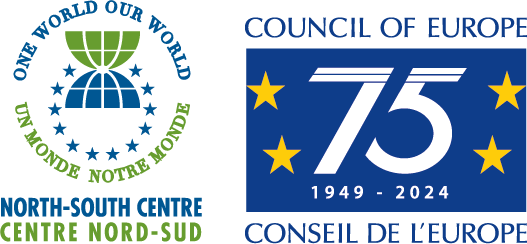The Intercultural Dimension of Global Education
Course description

Please be aware that the course promoted on this website is an online learning course and does not involve any travelling. However, in order to participate, you need to have regular access to the Internet.
The course has been designed to complement the Global Education Guidelines, a pedagogical tool for educators and policy makers to understand and implement Global Education, and share with a wider audience concepts and approaches promoted by the North-South Centre’s Global Education programme.
The course “Global Education - The Intercultural Dimension", provides an overview on why intercultural education is relevant and needed, what it means in theory and practice and how it can be improved in relation to the context of a globalised world, the local needs, its contents and methodology.
What is the content of the course
The course explores the ways of addressing the issues in theory and practice, reflecting on the ideal state considering the evidence from the reality, and developing new ways of understanding and promoting intercultural education in the contexts of the participants.
What are the specific contents?
Introduction to the intercultural dimension of global education
Reflecting on the needs for intercultural education
Reviewed concepts and approaches to intercultural education
Understanding of existing intercultural education in practice
Dilemmas and challenges in policy development towards intercultural education
Development of strategies for intercultural political education
Rights-based approaches to social and political action
What are the aims of the course?
To offer a platform to reflect on the role of intercultural education and the challenges posed by the local context in a globalised world
To reflect on the concepts and approaches related to global education and its intercultural dimension
To develop a better understanding of intercultural education, intercultural learning and intercultural competences
To review and strengthen the existing policy approaches to ensure quality standards and recognition of indercultural education
To strengthen the intercultural dialogue as part of political education
To connect local and international practitioners and other relevant actors in the field
To strengthen the network of global, human rights, and intercultural, education practitioners
Who provides the course?
The course has been developed in partnership between the North South Centre of the Council of Europe and The Network University.
The North-South Centre's mandate is to provide a framework for North-South cooperation to increase public awareness of global interdependence issues and promote policies of solidarity in conformity with the aims and principles of the Council of Europe: respect for human rights, democracy and the rule of law.
The Network University (TNU) facilitates innovative learning and capacity building for a global network of professionals, students, non-profit organizations, agencies and networks, specializing in creating e-tools for education and networking in the field of development.
Who can apply?
The course in general is targeted at formal and non-formal educators, policymakers and media professionals. The course also welcomes students with a special interest in the topic.
Please note that all participants should:

be able to spend a minimum of 10 hours per week (every week) on course work;
have basic Information and Communication Technology skills and a minimum of internet access.
Costs, dates and deadline
Costs
The North South Centre will provide scholarships of 400 €, corresponding to the course value. The scholarships will be granted to selected applications on the basis of quality of the application and will cover the participation fee.
Dates: 29 October - 25 November
Deadline for application: 24 October
Didactics
This course favors collaborative learning. Participants are requested to actively contribute to the courses in form of discussions, asking critical questions to fellow participants and to the coaches, suggesting useful sites or cooperating with others in the completion of the assignments.
Participants are co-responsible for the exchange of knowledge and the level of interaction. This process is facilitated by the daily availability of the coaches who guide participants through the learning process within your online learning community.
Every week there will be different assignments. The assignments aim at reflecting the content provided and stimulating discussion for a further deepening of the content. Parallel to the assignments, the 'Forum' provides an explicit space for further debate, questions and exchange of knowledge.
The course is offered and supervised entirely on the Internet in English language.
Participants enter the course with an individual password, and attend at their own convenience, pace and level of intensity during the running of the course.
Weekly assignments and intensive discussions form a central part of the course to promote knowledge exchange and knowledge sharing among the participants, coaches and external experts involved.
First module
Introduction to Global Education: Reflecting on the Intercultural Dimension
The first module looks at the foundations of the intercultural dimension of global education. It starts with an overview of global education, leading to the positioning of its intercultural dimension in the local contexts considering the global processes. It also offers an overview of the different meanings associated with intercultural education and challenges related to its practice. Finally, this module explores the new emerging approaches to the intercultural dimension of global education and reflects on intercultural competences.
Second module
Understanding Intercultural Learning as an Educational Practice
The second module of this course discusses the different spheres of the intercultural dimension in relation to anti-racism, anti-Semitism, Xenophobia, Homophobia, and other forms of intolerance, and how they are addressed in the educational practice at local, national, regional and international levels. It also focusses on intercultural competences necessary for a new approach towards the intercultural dimension of global education.
Third module
Designing intercultural dialogue in policy making
The third module of this course examines the possible levels of interventions having in mind the intercultural dimension of global education in policy making. It considers intercultural dialogue as one of the strategic instruments for policy making. It also tackles the challenges related to quality standards and recognition of intercultural education, as well as offers an opportunity to experience an interactive exercise on designing a global intercultural education policy.
Fourth module
Intercultural education as part of social and political action
The fourth module of this course focuses on the practical use of the intercultural dimension of global education in terms of political and social action. It also explored the applicability of a rights-based approach in intercultural education leading towards political activism. It also includes the evaluation and a debate on the follow up to the course.

+351 213 584 030
1200-829 Lisbon - PORTUGAL


